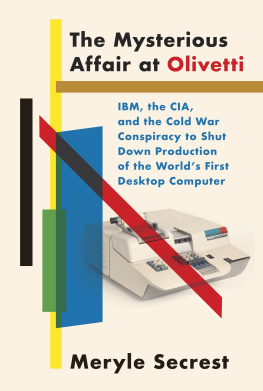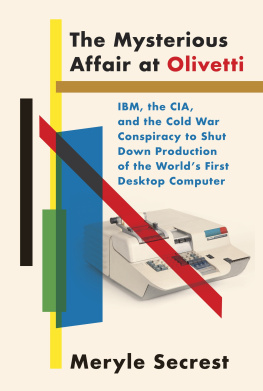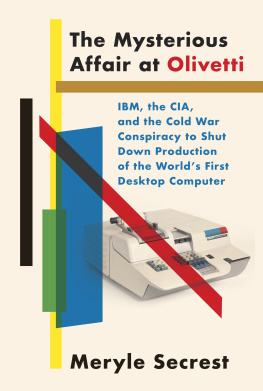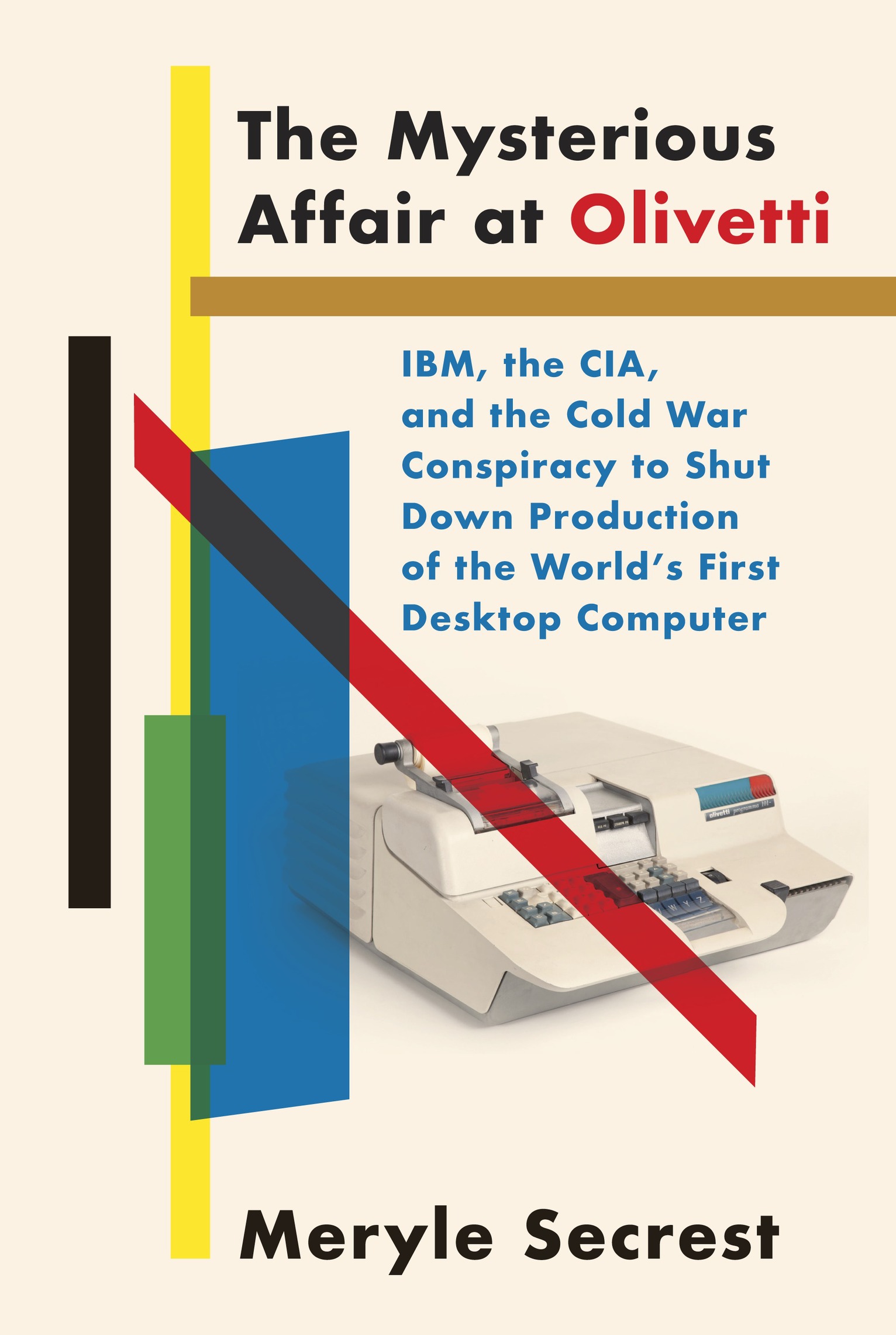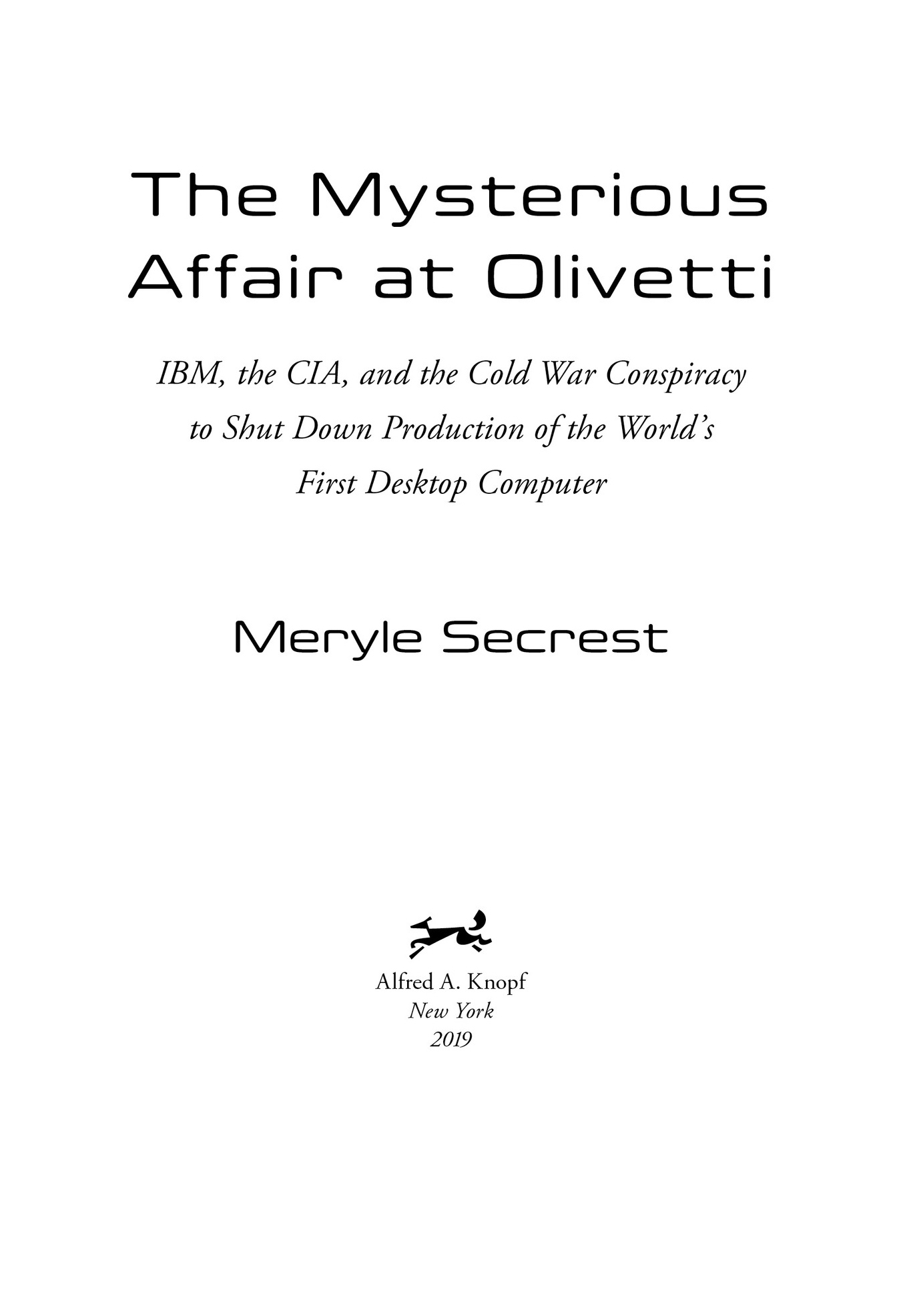Also by Meryle Secrest
Elsa Schiaparelli: A Biography
Modigliani: A Life
Shoot the Widow
Duveen: A Life in Art
Somewhere for Me: A Biography of Richard Rodgers
Stephen Sondheim: A Life
Leonard Bernstein: A Life
Frank Lloyd Wright: A Biography
Salvador Dal
Kenneth Clark: A Biography
Being Bernard Berenson: A Biography
Between Me and Life: A Biography of Romaine Brooks
THIS IS A BORZOI BOOK
PUBLISHED BY ALFRED A. KNOPF
Copyright 2019 by Meryle Secrest Beveridge
All rights reserved. Published in the United States by Alfred A. Knopf, a division of Penguin Random House LLC, New York, and distributed in Canada by Random House of Canada, a division of Penguin Random House Canada Limited, Toronto.
www.aaknopf.com
Knopf, Borzoi Books, and the colophon are registered trademarks of Penguin Random House LLC.
Library of Congress Cataloging-in-Publication Data
Names: Secrest, Meryle, author.
Title: The mysterious affair at Olivetti : IBM, the CIA, and the Cold War conspiracy to shut down production of the worlds first desktop computer / by Meryle Secrest.
Description: First Edition. | New York : Alfred A. Knopf, [2019] | Includes bibliographical references and index.
Identifiers: LCCN 2018059556 (print) | LCCN 2019009701 (ebook) | ISBN 9780451493668 (ebook) | ISBN 9780451493651 (hc)
Subjects: LCSH: Ing. C. Olivetti & C. Divisione elettronicaHistory. | Computer industryItalyHistory20th century. | Computer scienceItalyHistory20th century.
Classification: LCC HD9696.2.I82 (ebook) | LCC HD9696.2.I82 S43 2019 (print) | DDC 338.7/6213916094509048dc23
LC record available at https://lccn.loc.gov/2018059556
Ebook ISBN9780451493668
Cover image: Olivetti Programma 101. Museo Nazionale della Scienza e della Tecnologia Leonardo da Vinci, Milan. Wikimedia Creative Commons
Cover design by Kelly Blair
v5.4
ep
For Desire, David, Philip, Matthew, Lidia, the two Annas, Annalisa, Elisa, Albertina, Francesca, Beniamino, Franco, Gregorio, Domenico, Milton, Roberto B., and all those others whose generous help made this book possible. And in memory of Roberto Olivetti.
Of truth we know nothing, for truth lies at the bottom of a well.
Democritus
Vespasiano da Bisticci asked Federiqo da Montefeltro, first Duke of Urbino, what is necessary in ruling a kingdom; the Duke replied, essere umanoto be human.
Kenneth Clark, Civilisation
Contents
Preface
This book came about in a curious way. Like most authors, I had assembled a collection of short stories but had never sold any of them. One of them seemed rather better realized, so I read it carefully. It described a weekend in Washington I had spent with Roberto, the son of Adriano Olivetti, the charismatic figure who had guided the fortunes of this family-owned, Italian office equipment company during and after World War II. My good friend, Caroline Scott Despard, had fallen in love with Roberto when she was living in Italy after the war. However she broke the engagement, moved back to the U.S., and was planning to marry someone else that particular Halloween Saturday night of 1964. Roberto, who happened to be in New York, called her out of the blue. He wanted to fly to Washington and take her out to dinner. She, in a panic, called me. She was bringing her new amour, Sam, to the dinner without telling Roberto. Would I come too? I joined them rather reluctantly and spent what was left of the weekend taking Roberto around the city.
I never saw Roberto again. I discovered that in Dinner with Roberto I had attempted a character study of this interesting engineer, a personal portrait, because I never asked him about his company, which, as I understood eventually, was in crisis just at that moment. It suddenly became important to know whatever had happened to Roberto. I looked up his obituaries. He died in 1985 at the age of fifty-seven. The obituaries would not give the cause of death. For reasons that will become clear, I was convinced he must have died in a car accident. I persisted and finally made telephone contact with Robertos only child, Desire, living in Italy. That illuminating conversation led to other discoveries. These included the news that Olivetti had invented the worlds first desktop computer, a fact that is not reported in most computer histories. The company itself is now defunct. I found I had opened the door upon a Cold War mystery and a major industrial spy story with the Olivetti family as its victims. This account is the result.
1
Oranges
Carnival time in Ivrea, Italy, is celebrated each year as in many other parts of the world as a riot of exuberant excess before the sobering arrival of Lent. It is sometimes referred to as a carnival, and at others as the Festival of the Red Caps, and the Battle of the Oranges. Both are relevant because this annual ritual can be traced back for at least a thousand years. Historians believe it began as a fertility rite. Remnants of its ancient past can still be discerned; it ends, as it always has, with the burning of a tree, thought to refer to the ancient idea that if you wanted a bountiful spring, someone, or something, had to pay for it.
The custom of wearing a red cap came about during the French Revolution, in sympathy and solidarity. But when, or why, oranges became part of the proceedings no one really knows. That sunny, succulent fruit is not grown in these parts, which tend to have very cold wintersIvrea, a town in Piedmont, is picturesquely silhouetted right up against the Alps. But some kind of battle is certainly part of the legend that has been handed down, a fable that insinuated itself into the festival in the nineteenth century and gradually took over. Time moves so slowly in Ivrea that what is measured in decades in most parts of the world is calculated in centuries here. As the story goes, a tyrannical baron in the Middle Ages demanded such a ruinous increase in taxes that his subjects were close to starving. One night the baron, exercising his droit du seigneur, took a millers pretty daughter to bed. She was all prepared. At, one assumes, just the right psychological moment, she pulled out a dagger and expertly removed his head. A battle was joined. Soldiers were summoned to punish the citizens of Ivrea, only to be defeated by a handsome general who commanded a superior force. The town was saved and the pretty millers daughter destined to be celebrated by generations of grateful citizens who have no future and for whom past glories loom large.
To visit there for a few weeks is to return with vivid impressions: green water bubbling and churning in canal locks, an empty piazza, silent in the noonday sun, shutters banging, a mist on the mountain peaks. A girl in white goes by on a bicycle, silhouetted against black foothills, there are plastic flowers on a window ledge and graffiti on the windows of an abandoned hotel. Old men amble along the river walks by day. At night teenagers smoking cigarettes huddle, chatter, and silently slip away. Ducks gather in freeform patterns against the river banks. Lanterns creak and groan and bats wheel over the chimneys. The whole town is transfixed, as if a painted ship upon a painted ocean.

